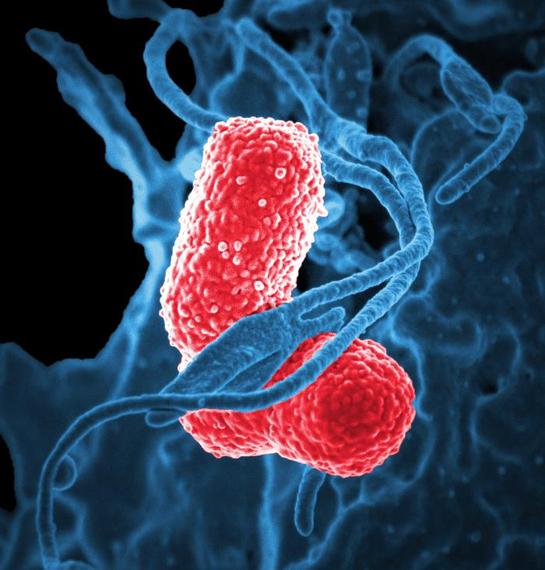
The food safety system in the U.S. has traditionally monitored a few well-known bacteria. We look for bugs such as Listeria, Salmonella and Campylobacter because they cause millions of food-borne infections every year. Today, my colleagues and I published research in the journal Clinical Infectious Diseases suggesting that it is time to add another pathogen to the list of bad bugs in our food. The research shows that the bacterium, Klebsiella pneumoniae, frequently contaminates meat sold in grocery stores. This nasty bug can cause urinary tract infections, liver abscesses and bloodstream infections.
Klebsiella pneumoniae is usually thought of as an organism that people get from the environment, yet this study suggests we might also pick up these bacteria from handling or eating meat products. The study compared Klebsiella pneumoniae isolates from retail meat products sold in nine major grocery stores in Arizona in 2012 and clinical samples taken from people suffering from infections in the same geographic area. The results showed that Klebsiella pneumoniae is not only in our food supply, but that contaminated meat may be an important vehicle for transmitting Klebsiella pneumoniae from food animals to people.
One of the reasons that we may have ignored Klebsiella pneumoniae in the food supply is that it doesn't cause the kinds of diseases we typically associate with food, things like diarrhea and vomiting. Instead, Klebsiella pneumoniae can colonize the human gut indefinitely without symptoms and only causes infections when it gets transmitted to the urinary tract, lungs or blood. However, in many cases gut colonization is an important precursor to subsequent infection, and our study suggests that eating contaminated food may, in some cases, kick off this potentially dangerous process.
This study also provides more context to antibiotic use in food animal production. These life-saving drugs are often used in animals to prevent diseases caused by production practices that make them sick. Our data shows that foodborne Klebsiella pneumoniae were resistant to many of the same antibiotics approved for use in food animal production. While, we need to better quantify the relationship between antibiotic use in food animal production and antibiotic-resistant infections in people, foodborne Klebsiella pneumoniae may be yet another way that people are put at risk by what goes on in factory farming operations.
This study's findings add to the ever growing collection of scientific research that shows how antibiotic overuse in food animal production breeds superbugs that end up in our bodies, food, air and water. At what point will there be enough scientific, peer-reviewed science and data to satisfy the debate on the role that antibiotic use in food animal production plays in the growing health crisis of antibiotic resistant infections in humans? As researchers, we continue to find more and more evidence, that we believe calls for urgent action by key stakeholders, including policymakers, pharmaceutical companies and the meat and poultry industry, to reduce the use of antibiotics in the production of food animals.
We need to take a close look at the meat and poultry production system in this country and find ways to improve it now so that we are all protected from the growing risk posed by bad bugs like Klebsiella pneumoniae.

